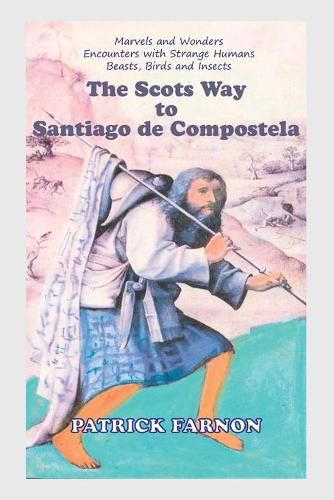Readings Newsletter
Become a Readings Member to make your shopping experience even easier.
Sign in or sign up for free!
You’re not far away from qualifying for FREE standard shipping within Australia
You’ve qualified for FREE standard shipping within Australia
The cart is loading…






This title is printed to order. This book may have been self-published. If so, we cannot guarantee the quality of the content. In the main most books will have gone through the editing process however some may not. We therefore suggest that you be aware of this before ordering this book. If in doubt check either the author or publisher’s details as we are unable to accept any returns unless they are faulty. Please contact us if you have any questions.
Looking at medieval maps of the traditional pilgrim routes to the Spanish cathedral city of Santiago de Compostela, it is noticeable that there are no roads from Scotland. Noticeable at least to the Scots author of this book. Patrick Farnon, who splits his time between Scotland, the Netherlands and Spain, says: I thought it might be a good idea to invent such a route. Of the various well-trodden roads to Santiago we have the French way (El Camino Frances), the Fisterra Way (El Camino de Fisterra), the English Way (El Camino Ingles), the Silver Way (La Via de La Plata from Seville), the Northern Way (El Camino del Norte, along the Cantabrian and Basque coasts) and the Primitive Way (El Camino Primitivo, from Oviedo). There’s also a Portuguese Way. So why not a Scots Way to Santiago? The situation now stands corrected. In this amusing record of a personal odyssey across the shoulder of Spain looking for the links between the Scots and the Spanish, Farnon mixes the Medieval with the Modern and discovers all sorts of marvels and wonders as well as a few charlatans. In this account he covers the Camino Frances to Santiago de Compostela and way back via the Camino de Fisterra and the Camino del Norte, a trip of nearly two thousand kilometres. He also finds more than a few ancient links, which means there is at last a Scots Way to Santiago de Compostela, even if it is a very singular one.
$9.00 standard shipping within Australia
FREE standard shipping within Australia for orders over $100.00
Express & International shipping calculated at checkout
This title is printed to order. This book may have been self-published. If so, we cannot guarantee the quality of the content. In the main most books will have gone through the editing process however some may not. We therefore suggest that you be aware of this before ordering this book. If in doubt check either the author or publisher’s details as we are unable to accept any returns unless they are faulty. Please contact us if you have any questions.
Looking at medieval maps of the traditional pilgrim routes to the Spanish cathedral city of Santiago de Compostela, it is noticeable that there are no roads from Scotland. Noticeable at least to the Scots author of this book. Patrick Farnon, who splits his time between Scotland, the Netherlands and Spain, says: I thought it might be a good idea to invent such a route. Of the various well-trodden roads to Santiago we have the French way (El Camino Frances), the Fisterra Way (El Camino de Fisterra), the English Way (El Camino Ingles), the Silver Way (La Via de La Plata from Seville), the Northern Way (El Camino del Norte, along the Cantabrian and Basque coasts) and the Primitive Way (El Camino Primitivo, from Oviedo). There’s also a Portuguese Way. So why not a Scots Way to Santiago? The situation now stands corrected. In this amusing record of a personal odyssey across the shoulder of Spain looking for the links between the Scots and the Spanish, Farnon mixes the Medieval with the Modern and discovers all sorts of marvels and wonders as well as a few charlatans. In this account he covers the Camino Frances to Santiago de Compostela and way back via the Camino de Fisterra and the Camino del Norte, a trip of nearly two thousand kilometres. He also finds more than a few ancient links, which means there is at last a Scots Way to Santiago de Compostela, even if it is a very singular one.